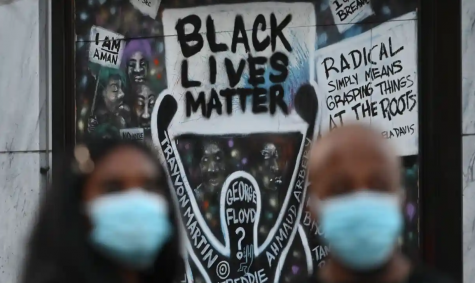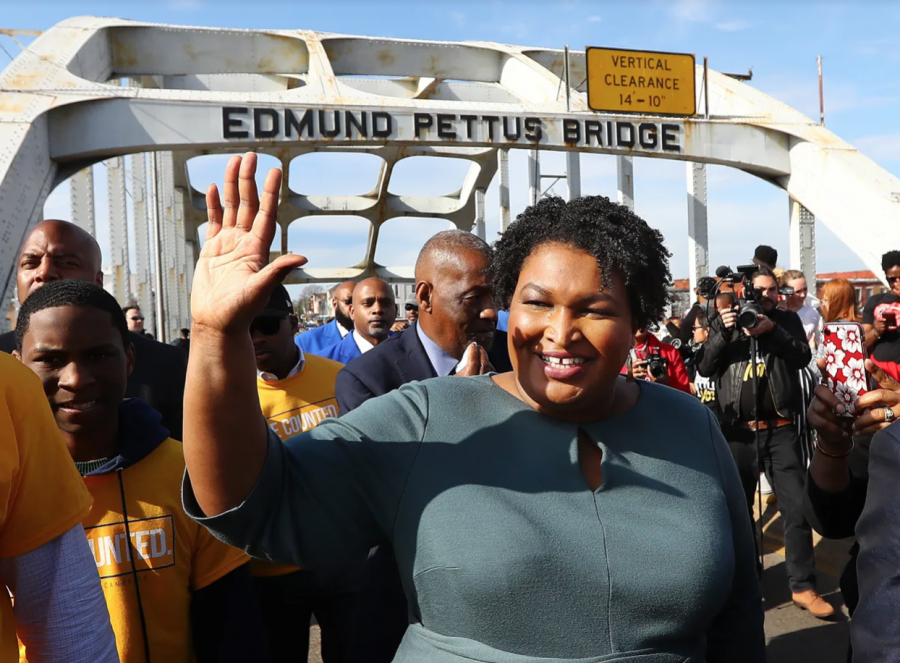Stacey Abrams & BLM Nobel Peace Prize Nominations
Former candidate for Georgia governor Stacey Abrams crosses the Edmund Pettus Bridge during the annual reenactment of Bloody Sunday on Sunday, March 1, 2020, in Selma, Alabama. (Courtesy of Curtis Compton/Atlanta Journal-Constitution/TNS)
March 15, 2021
The year 2020 witnessed both an unprecedented international reckoning against police brutality and one of the most contentious U.S. presidential elections in modern American history. Ultimately, in November, it was determined that Joe Biden won the presidential victory, but without a solid majority in the Senate, Democrats were not optimistic about their prospects of advancing the Biden administration’s legislative agenda. However, in the concurrent November 2020 Georgia senate race, no candidate won the required majority of votes. Therefore, a special runoff election was scheduled for January.
Historically, Georgia has demonstrated intentional voter suppression tactics against racial minorities. Since these targeted groups comprise a large portion of the modern Democratic party’s base, it initially appeared as though the Democratic senatorial candidates Jon Ossoff and Reverend Raphael Warnock were not poised to defeat the incumbent Republican candidates David Perdue and Kelly Loeffler, respectively. However, former Georgia gubernatorial candidate, Stacey Abrams, organized a statewide movement that prompted enough voter turnout to not only flip her historically red state blue in the presidential election but to also elect two Democratic senators, Ossoff and Warnock, giving Democrats a slim majority in the Senate with Vice President Kamala Harris as a tie-breaking vote.

In a year marked by such intense racial strife and widespread fights to advance equity by the Black Lives Matter movement, Stacey Abrams’s organization, Fair Fight Action, functioned as a vital vehicle to address systemic racial disenfranchisement and bring about nonviolent political and social change through the ballot box. As a result of their efforts, Abrams and the Black Lives Matter movement were each nominated for the 2021 Nobel Peace Prize. These unexpected and non-traditional choices joined a diverse cast of nominees such as Russian protestor Alexei Navalny, ex-President Donald Trump, his son-in-law Jared Kushner, climate change activist Greta Thunberg, and even the World Health Organization.
As expressed in his nomination letter, Petter Eide, a Norwegian parliamentarian, chose to nominate Black Lives Matter “for their struggle against racism and racially motivated violence.” Eide noted that the movement’s demands “for systemic change have spread around the world, forcing other countries to grapple with racism within their own societies.” Lars Haltbrekken, another Socialist member of Norway’s parliament, declared that he nominated Stacey Abrams because her “work follows in Dr. Martin Luther King Jr.’s footsteps in the fight for equality before the law and for civil rights.”
Both Abrams and Black Lives Matter have authored trailblazing movements for social justice at an inflection point in American history. Even more impressively, these nominees have managed to provide people around the world with hope in the promise of American progress at a critical moment in our national history at which seemingly everything was on the line. In the great tradition of famed American civil rights leaders, both nominees recognize that there can be no equality or freedom in the United States until all Americans have the ability to exercise an unobstructed right to vote and be treated equitably by law enforcement, thus empowering them to take action to create a more inclusive and prosperous future. The 2021 Nobel Peace Prize winner will be announced by the Norwegian Nobel Committee on October 8, 2021.



